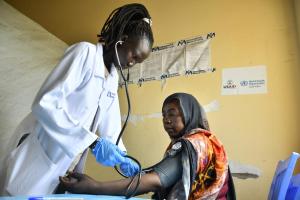Ensuring primary health care services for displaced people in South Sudan
Juba ‒ Cecilia Achuwor, a 38-year-old mother of six children, is one of the hundreds of thousands of refugees and returnees who have crossed the border into South Sudan since the beginning of the conflict in neighbouring Sudan 16 months ago. “My husband remains in Khartoum,” she says. “We separated from him without any communication. He doesn’t know where we are and we also don’t know where he is. I am here alone with the children, and they are all sick,” she says.
Achuwor, a South Sudanese national, is at a transit centre near Renk, a small town that borders Sudan to the north. Since the beginning of the Sudanese conflict, almost 60% of the 600 000 refugees and returnees who have entered South Sudan have done so through two points of entry near Renk. More recently, a new conflict has begun just to the east of Renk, and humanitarian workers have reported people arriving on foot through the bush.
“Rather than coming from an area like, say, Khartoum that had good access by road, now we’re seeing people literally walking into South Sudan for care and protection,” says Dr Brendan Dineen, World Health Organization (WHO) Emergency Preparedness and Response Officer in South Sudan. “So, the situation is worse than it was previously, and we are seeing many health challenges, humanitarian challenges, and protection challenges on a daily basis.”
Refugees and returnees often present with a range of infectious diseases, as well as chronic diseases. “At least 50% of the cases are communicable diseases. Malaria is on top of the list, followed by acute respiratory tract infections and we are seeing a rise in acute watery diarrhoea,” says Dr William Nazario, a doctor with International Medical Corps.
Meanwhile, Dr Ayuel Deng, Medical Officer for Renk County highlights that more and more people are presenting with hypertension, diabetes and cancers and require chronic medication and specialist services.
WHO is supporting county health authorities to coordinate the health response for returnees and refugees. At two transit centres near Renk, the Organization is providing supportive supervision to three health agencies ‒International Medical Corps, Relief International and World Vision International ‒ who deliver primary health care services to 4000 refugees and returnees a week.
This has helped to ensure better access to health services for these vulnerable populations, who have to endure difficult conditions at the transit centres. “The service here is good” says Nailla Elhadi Hamid, a 40-year-old refugee from Sudan. “I even brought my son here, who is sick with malaria, and the medicine is available. Before that, my sister had eye pain and she found the medicine was also available.”
Following a cholera outbreak in Sudan in September 2023, WHO has trained around 92 health care workers from health facilities around Renk in cholera surveillance, prevention, treatment and control. The Organization has established a cholera screening centre at the Wunthou point of entry. Since December 2023, 320 000 people have been assessed by health workers here, not only for cholera, but also other infections diseases and health conditions. “We also provide oral rehydration solution because where people have come from, they are weak.” says John Toch, a clinical nurse at the centre.
Since the start of the conflict, WHO has also distributed 119 metric tons of medical supplies and equipment to treat 680 000 people, including kits for a range of infectious diseases and malnutrition. As part of its cross-border collaboration, WHO South Sudan country office in partnership with the WHO Sudan country office delivered 51 metric tons of emergency health kits to reach 830 000 people living in conflict-affected communities near the border. “We really appreciate WHO, because they support us a lot in terms of supplies to our partners,” says Deng.
“WHO, health authorities and implementing partners are collaborating daily to deliver health services to refugees and returnees hoping for a better life,” says Dr Humphrey Karamagi, WHO Representative in South Sudan. “Without our donors this would not be possible. So, working together with others, WHO will continue to support the health emergency response in South Sudan.”
Communication Officer
Mobile: +211 921736375
Email: atema [at] who.int
Communications and marketing officer
Tel: + 242 06 520 65 65 (WhatsApp)
Email: boakyeagyemangc [at] who.int




